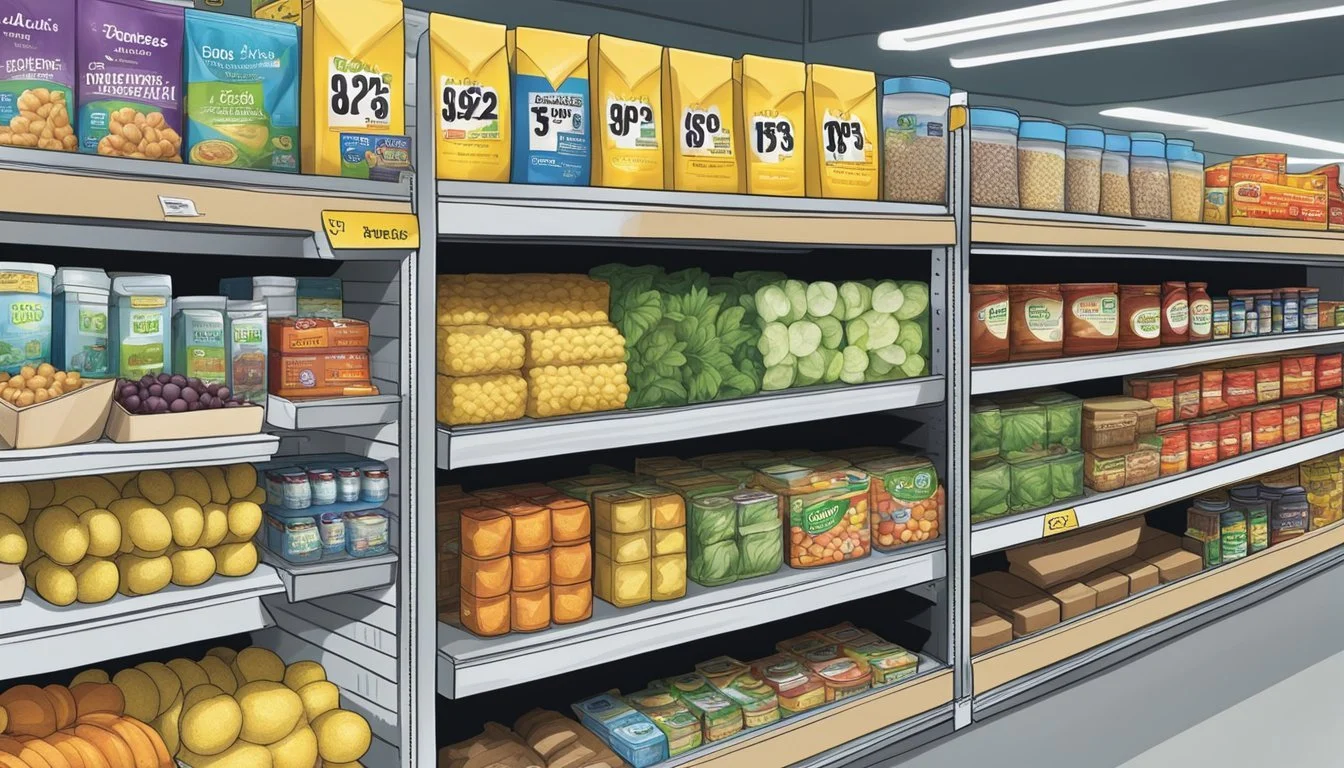Dollar General vs Trader Joe's
A Comprehensive Comparison of Price, Quality, and Selection
When it comes to grocery shopping, consumers are constantly seeking the best value for their money. Dollar General and Trader Joe's represent two distinct approaches to meeting shoppers' needs. While Dollar General focuses on offering everyday essentials at rock-bottom prices, Trader Joe's has carved out a niche with its curated selection of unique, high-quality products.
Trader Joe's generally offers better overall value than Dollar General for those seeking a diverse range of quality groceries at competitive prices. The beloved discount chain is known for its private-label products, free samples, and a shopping experience that encourages discovery of new foods. Dollar General, on the other hand, excels in providing basic necessities and household items at very low prices, making it a go-to for budget-conscious shoppers.
Both stores have their strengths, and the choice between them often depends on individual shopping needs and preferences. Trader Joe's appeals to those who prioritize organic options, specialty items, and a more enjoyable shopping atmosphere. Dollar General serves customers looking for quick, no-frills access to everyday staples at the lowest possible cost.
Company Overviews
Dollar General and Trader Joe's represent distinct approaches to grocery retail. These companies cater to different consumer segments with unique strategies and philosophies.
Dollar General's Retail Strategy
Dollar General focuses on providing affordable goods to rural and low-income communities. The retailer operates over 18,000 stores across 47 states, primarily in small towns and suburban areas. Its business model centers on offering a limited selection of everyday items at discounted prices.
Dollar General stores typically stock around 10,000 SKUs, including household essentials, packaged foods, and basic clothing. The company keeps costs low through efficient supply chain management and a no-frills store design. Many locations are small-format, allowing for quick shopping trips.
The retailer's "treasure hunt" merchandising strategy introduces new products regularly, encouraging frequent visits. Dollar General also emphasizes private label brands to maintain competitive pricing.
Trader Joe's Market Philosophy
Trader Joe's takes a distinctly different approach, positioning itself as a specialty grocer with a curated product selection. The company operates around 500 stores in 42 states and Washington D.C., targeting urban and suburban areas.
Trader Joe's is known for its unique, often internationally-inspired products and affordable prices on high-quality items. The retailer stocks approximately 4,000 SKUs, with 80% being private label. This strategy allows Trader Joe's to offer exclusive products at competitive prices.
The company cultivates a quirky, neighborhood store atmosphere with friendly staff in Hawaiian shirts. Trader Joe's emphasizes product quality and value, frequently rotating its selection to introduce new items. The retailer avoids traditional advertising, relying on word-of-mouth and its popular "Fearless Flyer" newsletter to promote products.
Product Assortment and Availability
Dollar General and Trader Joe's offer distinct product selections tailored to different consumer needs. Their assortments vary significantly in terms of private labels, grocery options, and specialty items.
Private Label Products
Dollar General's private label brands focus on budget-friendly essentials. Their Clover Valley line covers a wide range of pantry staples like cereal, peanut butter, and pasta. These products prioritize affordability over premium quality.
Trader Joe's, in contrast, is renowned for its extensive private label offerings. Nearly 80% of their products bear the Trader Joe's name. These items often match or exceed national brand quality at lower prices. Popular examples include their unique snacks, frozen meals, and specialty sauces.
Processed and Perishable Groceries
Dollar General carries a limited selection of perishables. Their stores typically stock basic produce like bananas and potatoes. The focus is on packaged foods with longer shelf lives.
Trader Joe's offers a broader range of fresh produce, meats, and dairy. Their selection includes organic options and pre-cut fruits and vegetables. The store is known for its diverse cheese selection and high-quality frozen foods.
Specialty Items and Unique Finds
Dollar General's specialty items are limited. They occasionally stock seasonal products or trendy snacks, but the selection is not a core focus.
Trader Joe's excels in this area. The store constantly introduces new and unique products. Shoppers can find items like cookie butter, everything bagel seasoning, and unexpected flavor combinations. Seasonal offerings and international foods are also prominent. Trader Joe's often rotates its product selection, encouraging customers to try new items regularly.
Price Comparison and Value for Money
Dollar General and Trader Joe's offer distinct pricing strategies and product selections. Their approaches to everyday essentials and specialty items can impact overall value for shoppers.
Everyday Essentials
Dollar General focuses on competitive pricing for basic groceries and household items. The store's no-frills approach keeps costs down on staples like eggs, milk, and bread.
Trader Joe's takes a different tack, offering unique private-label products at reasonable prices. Their eggs and milk are often priced comparably to conventional supermarkets. Trader Joe's bread selection tends to be more artisanal, which can lead to higher prices.
For budget-conscious shoppers, Dollar General may edge out Trader Joe's on everyday basics. However, Trader Joe's can provide good value on certain items, especially when factoring in quality and variety.
Organic and Specialty Products
Trader Joe's shines in the organic and specialty product categories. Their organic 2% milk is typically priced lower than national brands at traditional grocery stores. The store's wide array of unique snacks, frozen meals, and international foods often come at competitive prices.
Dollar General's organic and specialty offerings are more limited. While they have expanded their selection in recent years, prices on these items may not be as competitive as their conventional counterparts.
For shoppers seeking organic options or unique food items, Trader Joe's generally provides better value. Their curated selection and private-label approach allow for quality products at accessible price points.
Store Experience and Customer Perception
Dollar General and Trader Joe's offer distinctly different shopping experiences. The stores' layouts, customer service approaches, and promotional strategies shape how customers perceive and interact with each brand.
Store Layout and Design
Dollar General emphasizes efficiency and low prices in its store design. Aisles are typically narrow and packed with goods, prioritizing product variety over aesthetics. The stores use bright fluorescent lighting and simple shelving to keep costs down.
Trader Joe's, in contrast, creates a more inviting atmosphere. Its stores feature wider aisles, wood accents, and energy-efficient lighting. Handwritten signs and quirky product descriptions add personality to the shopping experience. Trader Joe's compact store size makes navigation easier for customers.
Customer Service and Satisfaction
Dollar General focuses on quick transactions and self-service. Cashiers are trained to process sales rapidly, but may not offer extensive product knowledge. The company aims to maintain low prices by limiting labor costs.
Trader Joe's is known for friendly, knowledgeable staff. Employees wear Hawaiian shirts and are encouraged to engage with customers. They often offer personalized recommendations and are trained to answer questions about products. This approach contributes to higher customer satisfaction scores for Trader Joe's.
Marketing and In-Store Promotions
Dollar General relies heavily on price-based marketing. The company uses weekly circulars and in-store signage to highlight deals. Digital coupons are available through their app, but the stores rarely offer free samples or experiential marketing.
Trader Joe's takes a different approach. The company doesn't use traditional advertising or loyalty programs. Instead, it focuses on creating a unique in-store experience. Free samples are common, allowing customers to try new products. Trader Joe's also publishes a quirky product guide called the "Fearless Flyer" to showcase new and seasonal items.
Operations and Ethical Practices
Dollar General and Trader Joe's operate with distinct supply chain strategies and environmental initiatives. These practices shape their product offerings, pricing, and overall customer experience.
Supply Chain and Sourcing
Dollar General relies on a vast network of suppliers to stock its shelves with low-cost items. The company often works with middlemen to source products from various manufacturers. This approach allows Dollar General to offer competitive prices but can lead to inconsistent product quality.
Trader Joe's takes a different route. The retailer works directly with suppliers, cutting out middlemen to reduce costs. Many Trader Joe's products are private label, allowing for better quality control and unique offerings. The company emphasizes relationships with local producers when possible, though it also sources globally for specialty items.
Environmental Initiatives
Dollar General has made limited public commitments to environmental sustainability. The company focuses more on operational efficiency to reduce costs, which can have some positive environmental impacts such as reduced energy use in stores.
Trader Joe's has implemented several eco-friendly practices. The retailer has pledged to reduce plastic packaging and increase the use of renewable materials. Trader Joe's also donates unsold food to local food banks, reducing waste. The company has invested in energy-efficient lighting and refrigeration systems in its stores.
Both retailers face ongoing challenges in balancing environmental concerns with cost-effective operations. Trader Joe's appears to have made more visible strides in this area compared to Dollar General.
Impact of Retail Giants on Dollar General and Trader Joe's
Dollar General and Trader Joe's face significant competition from major retail giants. Their strategies and market positions are shaped by the actions of larger competitors in the grocery and discount store sectors.
Comparison with Walmart and Target
Walmart's vast scale and low prices pose challenges for Dollar General. To compete, Dollar General focuses on smaller stores in rural areas underserved by Walmart. It offers convenience and everyday low prices on essential items.
Target competes more directly with Trader Joe's in urban and suburban areas. Trader Joe's differentiates itself with unique private-label products and a curated shopping experience. This contrasts with Target's wider selection of national brands and general merchandise.
Both Dollar General and Trader Joe's emphasize efficiency to keep costs down. They typically have smaller stores and more limited product ranges than Walmart or Target.
Responses to Costco and Whole Foods Competition
Costco's bulk-buying model differs from Dollar General and Trader Joe's approach. Dollar General focuses on small, frequent purchases. Trader Joe's emphasizes affordable gourmet and specialty items.
Trader Joe's competes with Whole Foods by offering natural and organic products at lower prices. It leverages private-label products to provide unique, high-quality options affordably.
Both chains have expanded their fresh food offerings in response to competition. Dollar General has added produce sections to thousands of stores. Trader Joe's continues to innovate with new prepared foods and snacks.
Neither matches Costco's membership model or Whole Foods' extensive organic selection. Instead, they carve out distinct niches based on convenience, value, and unique product offerings.
Analyzing Consumer Demographics
Dollar General and Trader Joe's cater to distinct consumer segments with differing income levels, education backgrounds, and shopping preferences. These demographic factors shape each retailer's product offerings and store locations.
Target Audiences
Dollar General primarily serves rural and low-income communities. Its core customers have annual household incomes under $40,000. Many live in areas with limited access to large supermarkets.
Trader Joe's attracts a more affluent demographic. About 25% of frequent shoppers have household incomes over $100,000. The typical customer is between 25-44 years old, white or Asian, and college-educated. Over 22% have graduate degrees, compared to less than 10% of U.S. adults overall.
Shopping Habits
Dollar General shoppers focus on budget-friendly basics and household essentials. They make frequent small trips for immediate needs. Many rely on SNAP benefits.
Trader Joe's customers seek unique, high-quality products at reasonable prices. They're drawn to the store's curated selection of private-label items. Popular purchases include wine, cheese, coffee, and nuts.
Trader Joe's shoppers tend to be health-conscious and environmentally aware. They're more likely to use social media and engage with brands online. Despite this, Trader Joe's doesn't offer e-commerce options.
Dollar General emphasizes convenience and value. Its stores stock a limited assortment of national brands and private-label goods. The company is expanding its fresh produce offerings to better serve food deserts.
Market Position and Future Outlook
Dollar General and Trader Joe's occupy distinct segments in the grocery retail market, with differing strategies for growth and expansion. Both face unique challenges and opportunities as they navigate changing consumer preferences and economic conditions.
Recent Growth and Expansion Plans
Dollar General has aggressively expanded its store network, adding thousands of new locations annually. The retailer aims to reach underserved rural and urban areas with its low-price model. In contrast, Trader Joe's pursues a more measured growth strategy, carefully selecting new store locations in affluent urban and suburban markets.
Dollar General plans to open 1,050 new stores in 2024, focusing on its larger-format DG Market concept. Trader Joe's expansion is more conservative, typically adding 30-40 new stores per year in strategic locations.
Both chains are investing in their private label offerings. Dollar General is expanding its store brand selection to compete with national brands. Trader Joe's continues to innovate with unique private label products that drive customer loyalty.
Challenges and Opportunities
Dollar General faces increasing competition from other discount retailers and pressure to improve store conditions. The chain must balance its low-cost model with the need to upgrade aging locations and enhance the shopping experience.
Trader Joe's biggest challenge is maintaining its cult-like following while expanding. The retailer must preserve its quirky culture and product quality as it grows. Supply chain disruptions and inflation pose risks to its value proposition.
Both chains have opportunities in e-commerce and digital engagement. Dollar General is rolling out more robust online ordering and pickup options. Trader Joe's has been slower to embrace e-commerce but is exploring ways to connect with customers digitally without compromising its in-store experience.







